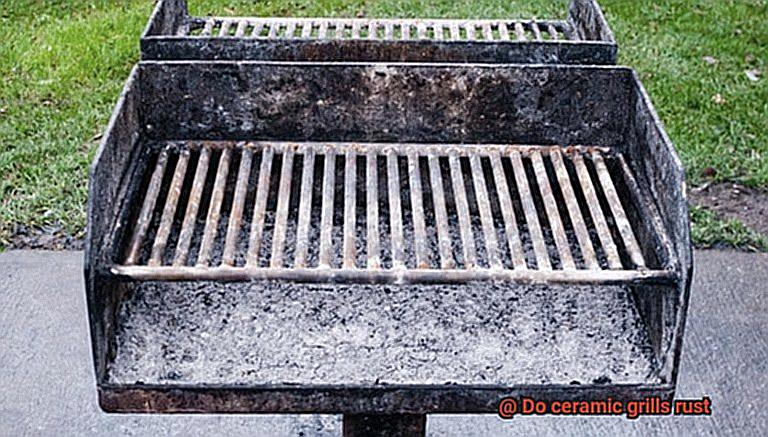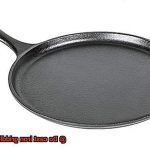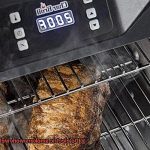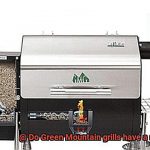Are you a proud ceramic grill owner? There’s nothing quite like the satisfaction of cooking up a mouth-watering steak on your trusty grill. But what happens when you start noticing rust or discoloration after just a few months of use? Don’t panic – it’s not uncommon for ceramic grills to experience some rust. The real question is, why does it happen and how can you prevent it?
It’s important to note that ceramic grills are built to withstand the test of time and are highly resistant to rust and corrosion. However, several factors may still contribute to rust formation, such as atmospheric moisture, improper usage, and exposure to harsh elements.
In this blog post, we’ll dive deep into the reasons why your ceramic grill may be prone to rusting, the potential effects on both your grill and food, and most importantly – how you can prevent it from happening in the first place. We’ll also share some practical tips on cleaning and maintaining your ceramic grill so that it lasts for years to come.
So, if you’re wondering whether your beloved grill is susceptible to rusting or simply want some expert advice on how best to protect it, then keep reading – we’ve got you covered.
Contents
What are Ceramic Grills?
Ceramic grills, also known as kamado grills, are a new and exciting way to elevate your outdoor cooking game. These grills are made of high-quality ceramic material, which provides superior insulation and temperature control compared to traditional metal grills.
One of the most notable features of ceramic grills is their ability to retain heat. The ceramic construction maintains a consistent temperature for long periods, making it perfect for slow-cooking meats and other dishes that require low and slow cooking. The interior of the grill is dome-shaped, distributing heat evenly around the cooking surface. The lid is also made of ceramic material, which helps to trap heat and smoke inside the grill for added flavor.
Not only do ceramic grills offer excellent temperature control, but they are also incredibly versatile. They can be used for grilling, smoking, roasting, and even baking. Some models come with accessories like pizza stones and rotisserie kits, making them an all-in-one outdoor cooking appliance.
Another significant advantage of ceramic grills is their resistance to rusting. Unlike traditional metal grills that can rust over time due to exposure to moisture and air, ceramic grills are made of non-corrosive materials that prevent rust from forming. However, it’s essential to note that the metal components such as hinges, latches, and cooking grates may still be susceptible to rust if not properly cared for.
Ceramic grills come in various sizes and shapes, ensuring you can find one that suits your needs. Whether you’re a seasoned grill master or just starting out on your outdoor cooking journey, a ceramic grill is definitely worth considering for its unique design and excellent insulation.
Benefits of Ceramic Grills
It’s time to upgrade to a ceramic grill. These sleek and stylish grills are becoming increasingly popular among outdoor cooking enthusiasts due to their unique features and benefits.
Versatility is key with ceramic grills. Not only can they be used for grilling, but also for slow cooking and smoking. With a wide range of temperature options, you can cook anything from a juicy steak to a perfectly smoked brisket. The even heating promotes even cooking and allows you to experiment with new recipes.
Another significant advantage of ceramic grills is their ability to retain moisture. The ceramic material absorbs moisture, which is then released back into the food as it cooks, resulting in juicy and flavorful dishes. No more dried out chicken or pork.
Energy-efficiency is also a benefit of ceramic grills. They require less fuel to maintain their temperature compared to other types of grills, which means you can save money on fuel costs while still enjoying delicious grilled food. Plus, the fuel-efficient design makes them eco-friendly.
Durability and longevity are essential features of any outdoor cooking equipment. Ceramic grills can withstand extreme temperatures without cracking or rusting, making them an excellent investment for anyone who loves outdoor cooking. The ceramic material is also resistant to corrosion and will not fade or peel over time.
Finally, ceramic grills promote healthier cooking. By keeping the food’s natural juices intact, there’s no need for added oils or fats. The even heating ensures that food is cooked thoroughly without burning or charring, resulting in healthier and tastier dishes.
Are Ceramic Grills Prone to Rusting?
And if you’re considering a ceramic grill, you might be wondering if it’s prone to rusting. Well, fear not, my fellow grill master – ceramic grills are known for their durability and resistance to rust.
The secret lies in the ceramic material itself. Unlike metal grills that can easily succumb to rust when exposed to moisture, ceramic grills are much more resilient in wet conditions. They are naturally resistant to rust and corrosion, making them an excellent choice for outdoor cooking in any weather.
But that’s not all – many ceramic grills come equipped with non-corrosive components like stainless steel grill grates and ash pans. These components add an extra layer of protection against rusting and ensure your grill stays in top shape for years to come.
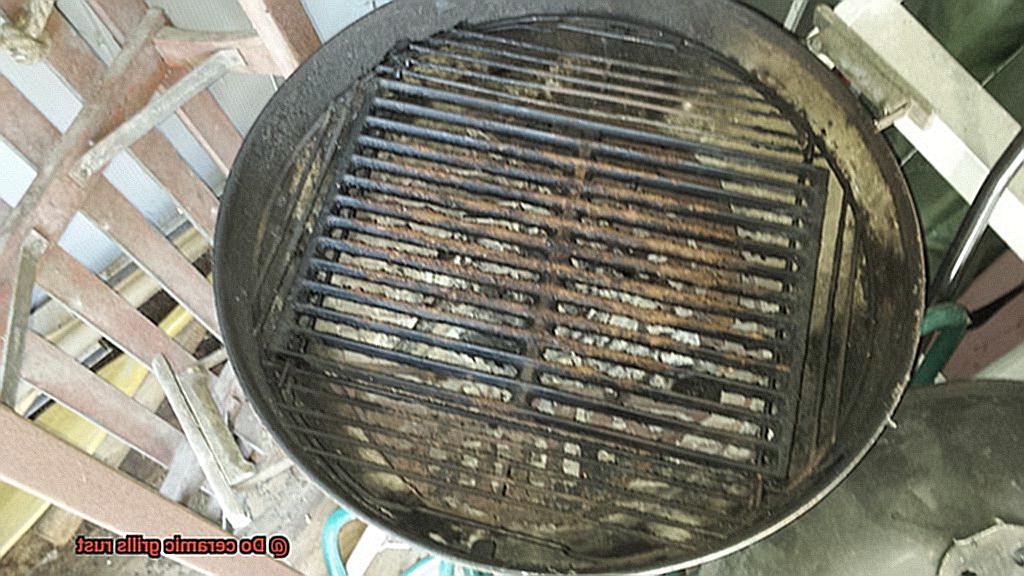
Of course, proper care and maintenance are still crucial for keeping your ceramic grill in tip-top condition. This means cleaning your grill regularly and covering it when not in use. And if you do happen to notice any signs of rust, don’t panic. It’s likely due to external factors like exposure to saltwater or harsh chemicals. Just clean the affected area and apply a rust inhibitor or protective coating as needed.
Why Ceramic Grills Don’t Rust
These super grills possess rust-resistant abilities that are unmatched by other materials.
The non-porous nature of ceramic material is the key to its rust resistance. Unlike other grill materials such as steel or iron, ceramic doesn’t absorb moisture, which is one of the primary causes of rust. By using ceramic, the risk of rust formation is significantly reduced.
But that’s not all. Ceramic grills also come with a protective glaze that acts as an extra barrier against moisture. This glaze is made from a mixture of minerals and oxides, applied to the surface of the ceramic before it’s fired at high temperatures. The result? A hard, durable finish that’s resistant to rust and corrosion.
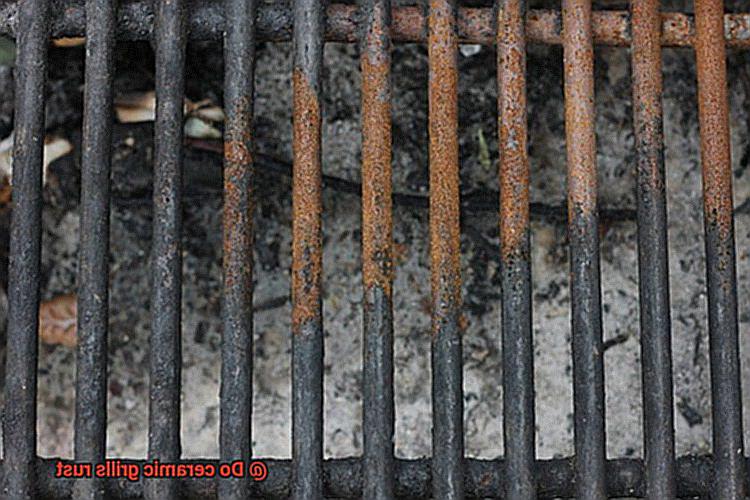
Another reason why ceramic grills don’t rust is their choice of fuel. Unlike traditional briquettes, ceramic grills use natural wood lump charcoal. This charcoal produces less ash and contains fewer impurities, which means there’s less chance for debris to accumulate on the surface of the grill and cause rusting.
Ceramic grills also feature stainless steel components, such as grates and hardware. Stainless steel is highly resistant to rust and corrosion, making it an ideal material for outdoor cooking equipment.
Metal Components of a Ceramic Grill
Did you know that the metal components of your grill need to be maintained too? In this article, we’ll explore the metal components of a ceramic grill and how to prevent rust from forming.
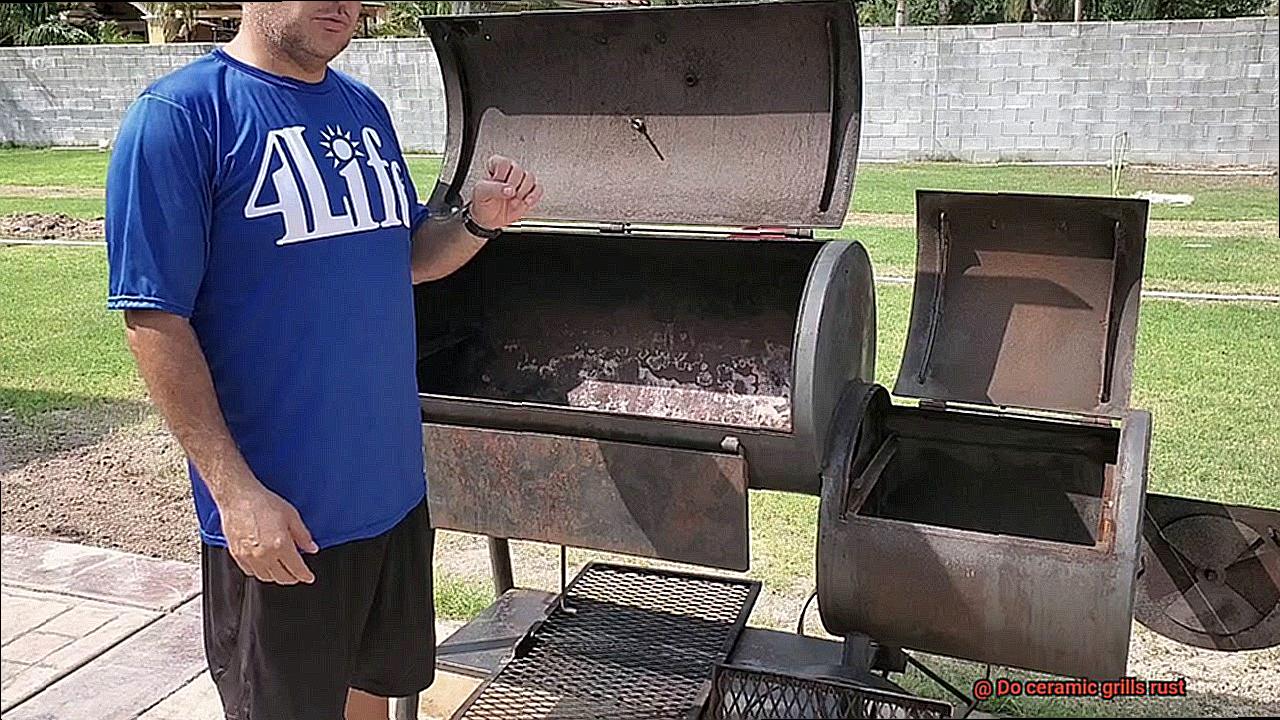
Let’s begin with hinges, which are crucial for opening and closing your grill. Typically made of stainless steel or cast iron, hinges can corrode over time if left unattended. To avoid rust formation, it’s essential to keep your hinges clean and dry. Additionally, regular maintenance with a non-abrasive cleaner can help increase their lifespan.
Next, bolts and screws play a vital role in holding your grill together. Since these components are exposed to moisture, they are susceptible to rusting. Therefore, it’s important to inspect them frequently and replace any that exhibit signs of rusting. Stainless steel or galvanized bolts and screws are excellent alternatives since they are more resistant to corrosion.
Finally, let’s talk about grates, the backbone of your ceramic grill. Grates are usually made of stainless steel or cast iron, with stainless steel being the preferred material due to its resistance to rust. However, if you have cast iron grates, seasoning and proper maintenance are critical to prevent rust formation. After each use, season the grates with oil to keep them well-maintained.
How to Care for and Maintain Your Ceramic Grill
Ceramic grills are known for their durability and resistance to rust, but they still require proper care and maintenance to ensure longevity. Here are some tips on how to care for and maintain your ceramic grill.
First and foremost, keep it clean. It is essential to clean your ceramic grill after every use to prevent rust from forming. Use warm soapy water and a soft-bristled brush or sponge to wipe down the grill grates and interior walls. Avoid using abrasive cleaners or steel wool pads that can scratch the surface, as this can create an entry point for rust.
Secondly, invest in a high-quality cover that fits your ceramic grill properly. This will protect it from the elements, such as rain, snow, and sun exposure, which can cause rust to form. A cover will also shield your grill from dust and debris, making it easier to clean and maintain.
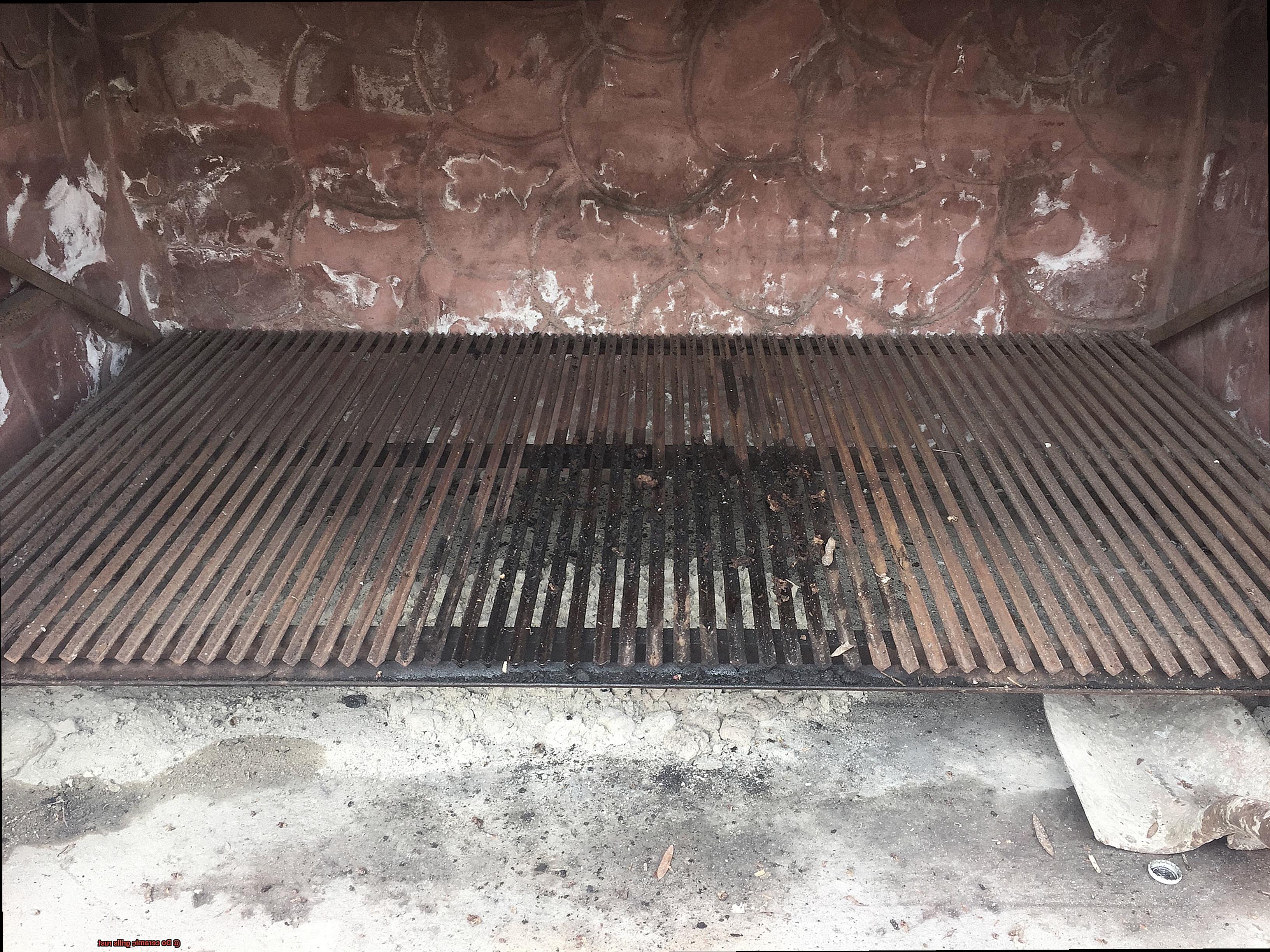
Thirdly, store your ceramic grill indoors if possible. Storing it inside will further protect it from weather damage and rust formation. If you must store it outside, make sure to cover it with a waterproof grill cover.
Fourthly, season the grates before using your ceramic grill for the first time. Seasoning the grates with oil or cooking spray will help prevent food from sticking and create a protective layer on the grates to prevent rust.
Lastly, inspect your ceramic grill regularly for any damages or cracks that can allow moisture to seep in. If you notice any damages, immediately repair them with a high-temperature silicone sealant. Checking for damages regularly will help you catch any issues early on before they escalate into more significant problems.
yuDwSi458Ro” >
Conclusion
To sum up, ceramic grills are the go-to choice for outdoor cooking aficionados who value top-notch performance and durability. Thanks to their high-quality ceramic construction, these grills boast exceptional insulation and temperature control that outshines traditional metal grills. Perhaps the most significant advantage of ceramic grills is their remarkable resistance to rust and corrosion. Unlike metal grills that can succumb to rust over time due to exposure to moisture and air, ceramic grills are crafted from non-corrosive materials that fend off rust formation.
However, keep in mind that various factors can still contribute to rusting in ceramic grills, including atmospheric moisture, improper usage, and exposure to harsh elements. It’s worth noting that even with ceramic grills’ anti-rust properties, some metal components like hinges, latches, and cooking grates may still be vulnerable to rust if not adequately maintained.
To keep your beloved grill in pristine condition for years on end, proper care and maintenance are crucial. This involves cleaning your grill regularly, investing in a high-quality cover that fits snugly over your grill, seasoning the grates before using them for the first time, inspecting your grill frequently for any damages or cracks that could allow moisture penetration, and storing it indoors if possible.
By following these tips on how best to safeguard your cherished ceramic grill from rusting or discoloration after just a few months of use, you can ensure it remains a reliable companion for all your outdoor culinary adventures.

